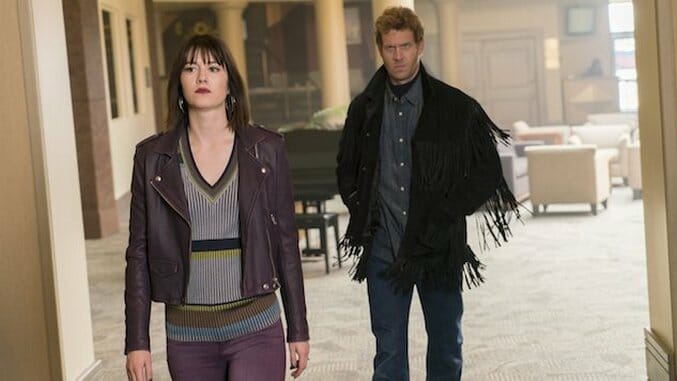The Women of Fargo Have Established Themselves As This Season’s Only True Heroes
(Episode 3.09)
Chris Large/FX
At the top of “Aporia,” Gloria Burgle (Carrie Coon) and Emmit Stussy (Ewan McGregor) sit alone in a starkly lit interrogation room. It’s not the first time these two have sat across from each other, but a long, dread-filled walk to V.M. Varga’s (David Thewlis) car later in the episode suggests that it might be the last. At the end of last week’s review, I mentioned that while Emmit was seemingly looking to confess his crimes to Gloria, the act wasn’t necessarily a way of atoning for his sins. The guiding force that’s thrown these people together, acting like a vengeful God experimenting with the degeneracy of humankind, isn’t in search of a confession, but an admission of wrongdoing. That means more than just confessing to a crime— it means recognizing the steps that were taken that led to the crime.
Emmit, for perhaps the first time in his life, is reckoning with the fact that he’s never been a good brother, and maybe not a very good person. When he lays out, in all the gory details, how a shard of glass ended up in Ray’s neck after an argument, he finishes with, “30 years I’ve been killing him. That’s just when he fell.” It’s a haunting statement, and a fine moment for McGregor, who up until this point has been solid in his role, if somewhat lost in the mix of outstanding turns from Carrie Coon, Mary Elizabeth Winstead, David Thewlis and Michal Stuhlbarg. What McGregor achieves, though, is some semblance of balance, challenging Emmit’s ignorance toward his own villainy and finding something compassionate in the process. Still, Emmit appears doomed; Varga has been killing him for months now, and it looks like it’s his time to fall.
“Aporia” is a remarkable episode because, not unlike like last week’s stunning exploration of fate and responsibility, it clarifies the season’s various narrative and thematic threads in a meaningful, rewarding way. Earlier this season, I worried that Fargo had followed its dark humor too far, to the point that the humor vanished and all that was left was a hefty dose of cynicism. Let that cynicism fester and you risk becoming something as vapid as House of Cards. Curb it and embrace it, and perhaps you can finding something more hopeful, à la The Leftovers, a show that found the light in the darkness across three superb seasons. Fargo isn’t aiming for the same moments of reckoning as The Leftovers, but it is interested in ideas of karma, destiny and the way we define ourselves through actions both moral and immoral.
If last week’s “Who Rules the Land of Denial?” shook up the status quo, then “Aporia” is the karmic follow up, the moment where things begin to balance out. This is where Fargo deserves some credit for its more cynical moments. Without them, perhaps the small victories of “Aporia” aren’t nearly as affecting. Take Nikki’s sit-down with Varga, wherein she blackmails the mob boss into (hopefully) giving her and Mr. Wrench (Russell Harvard) $2 million in exchange for the laptop and USB drives they stole from him. The heist sequence early in the episode is thrilling in its own right, the jazzy score, pared down to snappy snare hits and rim shots, driving the momentum of the scene, but it’s the sit-down meeting that really shines.
-

-

-

-

-

-

-

-

-

-

-

-

-

-

-

-

-

-

-

-

-

-

-

-

-

-

-

-

-

-

-

-

-

-

-

-

-

-

-

-








































